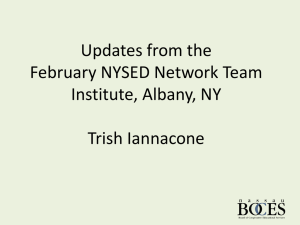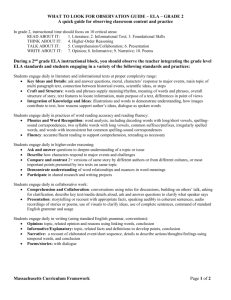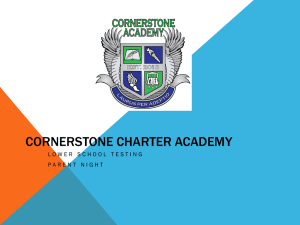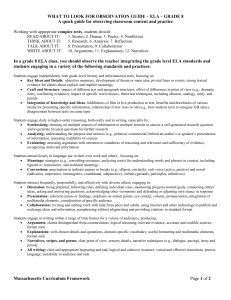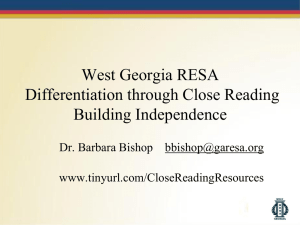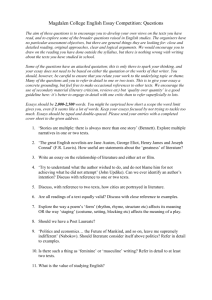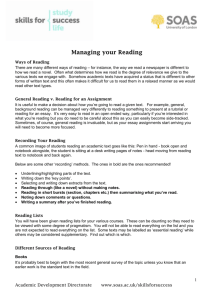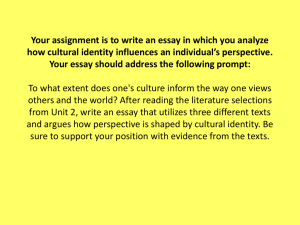Sample Interdisciplinary Performance Tasks
advertisement
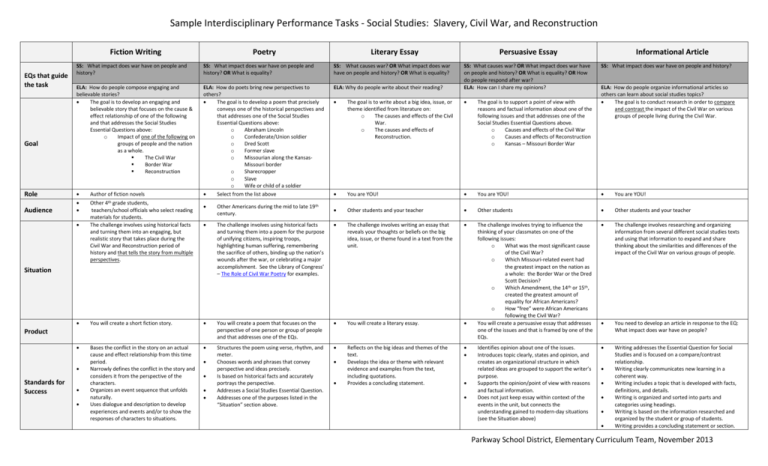
Sample Interdisciplinary Performance Tasks - Social Studies: Slavery, Civil War, and Reconstruction Fiction Writing Poetry Literary Essay Persuasive Essay Informational Article SS: What impact does war have on people and history? SS: What impact does war have on people and history? OR What is equality? SS: What causes war? OR What impact does war have on people and history? OR What is equality? ELA: How do people compose engaging and believable stories? The goal is to develop an engaging and believable story that focuses on the cause & effect relationship of one of the following and that addresses the Social Studies Essential Questions above: o Impact of one of the following on groups of people and the nation as a whole. The Civil War Border War Reconstruction ELA: How do poets bring new perspectives to others? The goal is to develop a poem that precisely conveys one of the historical perspectives and that addresses one of the Social Studies Essential Questions above: o Abraham Lincoln o Confederate/Union soldier o Dred Scott o Former slave o Missourian along the KansasMissouri border o Sharecropper o Slave o Wife or child of a soldier ELA: Why do people write about their reading? SS: What causes war? OR What impact does war have on people and history? OR What is equality? OR How do people respond after war? ELA: How can I share my opinions? The goal is to write about a big idea, issue, or theme identified from literature on: o The causes and effects of the Civil War. o The causes and effects of Reconstruction. The goal is to support a point of view with reasons and factual information about one of the following issues and that addresses one of the Social Studies Essential Questions above. o Causes and effects of the Civil War o Causes and effects of Reconstruction o Kansas – Missouri Border War Role Author of fiction novels You are YOU! You are YOU! You are YOU! Audience Other 4th grade students, teachers/school officials who select reading materials for students. The challenge involves using historical facts and turning them into an engaging, but realistic story that takes place during the Civil War and Reconstruction period of history and that tells the story from multiple perspectives. Other Americans during the mid to late century. Other students and your teacher Other students Other students and your teacher The challenge involves using historical facts and turning them into a poem for the purpose of unifying citizens, inspiring troops, highlighting human suffering, remembering the sacrifice of others, binding up the nation’s wounds after the war, or celebrating a major accomplishment. See the Library of Congress’ – The Role of Civil War Poetry for examples. The challenge involves writing an essay that reveals your thoughts or beliefs on the big idea, issue, or theme found in a text from the unit. The challenge involves researching and organizing information from several different social studies texts and using that information to expand and share thinking about the similarities and differences of the impact of the Civil War on various groups of people. You will create a short fiction story. You will create a poem that focuses on the perspective of one person or group of people and that addresses one of the EQs. You will create a literary essay. The challenge involves trying to influence the thinking of your classmates on one of the following issues: o What was the most significant cause of the Civil War? o Which Missouri-related event had the greatest impact on the nation as a whole: the Border War or the Dred Scott Decision? o Which Amendment, the 14th or 15th, created the greatest amount of equality for African Americans? o How “free” were African Americans following the Civil War? You will create a persuasive essay that addresses one of the issues and that is framed by one of the EQs. You need to develop an article in response to the EQ: What impact does war have on people? Bases the conflict in the story on an actual cause and effect relationship from this time period. Narrowly defines the conflict in the story and considers it from the perspective of the characters. Organizes an event sequence that unfolds naturally. Uses dialogue and description to develop experiences and events and/or to show the responses of characters to situations. Structures the poem using verse, rhythm, and meter. Chooses words and phrases that convey perspective and ideas precisely. Is based on historical facts and accurately portrays the perspective. Addresses a Social Studies Essential Question. Addresses one of the purposes listed in the “Situation” section above. Reflects on the big ideas and themes of the text. Develops the idea or theme with relevant evidence and examples from the text, including quotations. Provides a concluding statement. Identifies opinion about one of the issues. Introduces topic clearly, states and opinion, and creates an organizational structure in which related ideas are grouped to support the writer’s purpose. Supports the opinion/point of view with reasons and factual information. Does not just keep essay within context of the events in the unit, but connects the understanding gained to modern-day situations (see the Situation above) Writing addresses the Essential Question for Social Studies and is focused on a compare/contrast relationship. Writing clearly communicates new learning in a coherent way. Writing includes a topic that is developed with facts, definitions, and details. Writing is organized and sorted into parts and categories using headings. Writing is based on the information researched and organized by the student or group of students. Writing provides a concluding statement or section. EQs that guide the task Goal Situation Product Standards for Success Select from the list above 19th SS: What impact does war have on people and history? ELA: How do people organize informational articles so others can learn about social studies topics? The goal is to conduct research in order to compare and contrast the impact of the Civil War on various groups of people living during the Civil War. Parkway School District, Elementary Curriculum Team, November 2013 Sample Interdisciplinary Performance Tasks - Social Studies: Slavery, Civil War, and Reconstruction Key Considerations: 1. Like other informational texts, Social Studies-related texts are usually organized using problem-solution, cause-effect, and compare-contrast structures. Alerting students to these structures not only helps them navigate the texts in a more efficient and effective way, it also helps them begin to think about patterning their own writing in the content area after these structures. 2. The ability to engage in the close reading of Social Studies-related texts is a critical factor in determining the quality of the product that students create to represent their understanding of the topic. Mary Ehrenworth, deputy director of the Teachers College Reading and Writing Project at Columbia University, has suggested that it is important to teach students that there are “predictable questions readers can ask as they read to get more out of their reading.” Some questions that readers might pose are: What does this text want me to know? What information does this text teach? What does this text want me to understand? What new ideas and concepts does it suggest? What does this text want me to feel? What emotions does it stir up? How does it accomplish these tasks? Who perspective is represented in this text? Who point of view is most fully explored? Who is honored or privileged in the text and how? Who is marginalized? How does the perspective in this text compare with others on this issue? How does the author use persuasive techniques, literary devices, or writerly craft to convey meaning? 3. The ELA-Reading units teach students the skills of navigating non-fiction texts. It is critical to make intentional connections to these skills when students are engaged with Social Studies-related texts. If a performance task by a student lacks quality, relevant details and “misses the point”, consider teaching directly into these ELA skills during Social Studies. The following Reading units are especially applicable in preparing students for success during this unit: Historical Fiction, Navigating Nonfiction, Understanding Views, Values, and Cultures of Others, and Nonfiction Reading to Become Experts. Parkway School District, Elementary Curriculum Team, November 2013

